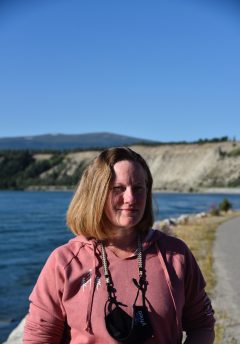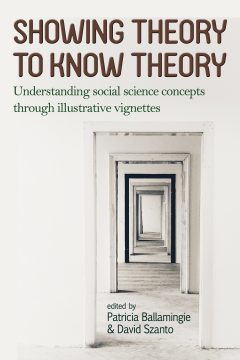Patricia Ballamingie
Spotlight on Professor Patricia Ballamingie

Tell us a little bit about yourself. What are your research interests? What are you working on right now?
I am a Professor in the Department of Geography and Environmental Studies, cross-appointed in the Institute of Political Economy, and I have been teaching at Carleton for almost two decades. My current program of research focuses on food policy and food systems governance, with an active set of affiliations and collaborations.
I have been involved for some time with Alison Blay-Palmer’s Nourishing Communities: Sustainable Local Food Systems Research Group at Wilfrid Laurier University. This research has allowed me to work closely with Peter Andrée and Irena Knezevic at Carleton—most recently on a SSHRC-funded Partnership Grant, Food: Locally Embedded, Globally Engaged (FLEdGE). We are coming to the end of seven years of fruitful collaboration, though I trust our work together will continue. We have published on integrative governance for an ecological public health, governance recommendations for a national food strategy, and community economy and urban gleaning.
I am also working with Charles Levkoe, Peter Andrée, and Amanda Wilson on a SSHRC-funded Insight Grant, Participatory Food Governance. This research looks at how civil society and social movement actors seek to influence food systems governance. Charles and I recently published an inaugural interview with food systems thinker and public intellectual, Wayne Roberts, in Canadian Food Studies. I am also conducting video interviews with food movement elders, which is work I treasure.
And finally, I am just beginning work with the First Nation of Na-Cho Nyàk Dun in Mayo, Yukon. I have a team of strong 4th-year and graduate students conducting applied research in response to community-driven priorities. Projects include explorations of Indigenous food sovereignty, northern food security, and community-led farms in the circumpolar north, among others.
What’s it like being a cross-appointed faculty member, working in the Geography department as well as the Institute of Political Economy? What intersections/overlaps do you find between political economy and geography, and how do they come about in your work?
I love the discipline of geography—specifically its core analytical lenses of place, space, scale, identity and community –which allow for the study of virtually anything related to human-environment connections. But my sub-disciplinary training is in political ecology, and I find the Institute a productive place to explore questions related to the operation of power, social construction of knowledge, and articulation of policy across scale. For the past decade or so, I have worked in the interdisciplinary realm of critical food studies—a field in which political economists play an important role.

You’re currently a Project Lead of Showing Theory to Know Theory: Understanding Social Science Concepts Through Illustrative Vignettes, a project that (if I’m understanding correctly!) aims to break down complex theories and jargon in artistic, interdisciplinary ways. What attracted you to this project? Tell us more about it!
Yes, I am co-editing this volume with my colleague, David Szanto, with funding from e-Campus Ontario. We are creating an online, open access text to help students understand complex theoretical concepts and disciplinary jargon from the critical social sciences.
By “illustrative vignettes”, we mean short, evocative stories, illustrations or infographics, poems, described photographs, or other audio-visual materials.
Our hope is that this open education resource will be of use across disciplines and community contexts, democratizing theory while linking it to practical, grounded experience.
We aim to demystify theoretical concepts, making abstract-yet-valuable ideas more accessible by “showing” (rather than “telling”) how they are meaningful and usable in day-to-day situations.
I think as scholars we need to hone our skills to communicate clearly and effectively to a broader audience, especially if we wish to effect change.
You’re teaching PECO 5001 (The Methodology of Political Economy) next semester. What about it are you most looking forward to?
I last taught PECO 5001 in 2013, though I have taught similar courses in geography throughout. I find the political economy cohort to be an optimal size—large enough to achieve a community of scholars, but small enough to enjoy some social cohesion. Over the years, I have supervised so many stellar students from this program. I am really looking forward to getting to know everyone—both current students and faculty affiliated with the institute.
PECO 5001 considers research design and methodology in a way the remains sensitive the construction of knowledge in the research process, power dynamics, ethical tensions, and knowledge mobilization. Students draft a tentative thesis proposal, and this is the scaffolding that helps them succeed in their degree.
You have a long history at Carleton—before becoming a Full Professor, you earned your PhD at Carleton, and have worked here in numerous roles. What’s your favourite thing about working and teaching at Carleton?
I love my colleagues: my research, teaching and staff colleagues! For me, Carleton’s strength lies in its people! It has been invaluable to connect with others beyond my department, by teaching in the Institute, serving on committees, and engaging in collaborative research projects.